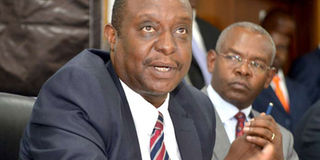Treasury CS issues warning to parastatals over taxes

National Treasury Cabinet Secretary Henry Rotich (left) speaks during the launch of M-Akiba at Treasury building in Nairobi on March 23, 2017. He has said parastatals must remit taxes on time. PHOTO | SALATON NJAU | NATION MEDIA GROUP
What you need to know:
- He promised to complete the merger of state corporations announced by President Kenyatta four years ago.
- Mr Obwocha said there has been a gap in how the political pillar of the Vision 2030 is being implemented.
State corporations will have to remit taxes and other deductions direct from their financial accounts in the latest bid to have government agencies honour their obligations on time.
National Treasury Cabinet Secretary Henry Rotich yesterday admitted before a gathering of parastatal chiefs to a “very big problem” in government agencies when it comes to remitting monies to the taxman, and warned those who will “routinely fail” to pay up may be shut down altogether.
“It is usually a high priority for any citizen to pay taxes. If you are withholding taxes for any employees, you have to remit them and any other taxes that you are required to pay,” Mr Rotich said.
TRACKING MONEY
The National Treasury, he said, has now authorised the Kenya Revenue Authority to link its online tax remittance system, also known as i-Tax, with financial accounts managed by state corporations.
The parastatals will also link these accounts to the Integrated Financial Management System used within the government in what the CS argued will help track their monies and give the taxman and other national funds their dues.
“We have made it a high priority now and we have even linked our i-Tax and Ifmis so as soon as money lands on any agency, and if you have not complied, the money is deducted automatically at source," he explained.
LOAN REPAYMENT
State corporations, despite having many employees and regular financial support from the National Treasury, have had consistent run-ins with the KRA, the National Social Security Fund (NSSF) and the National Hospital Insurance Fund (NHIF) for delayed remittance of deductions from staff.
Some financial institutions have also categorised these group of employees as risky in the way the loan repayments are delayed.
Mr Rotich was addressing a gathering of state corporation chairmen, chief executives and other senior state agency officers at the Kenya School of Government, where they were launching new courses targeting accounting officers.
FOREIGN TRAVELS
He promised to complete the merger of state corporations announced by President Kenyatta four years ago, “as soon as the law, when Cabinet passes, and when it is passed in parliament”.
But his Public Service counterpart Sicily Kariuki, who launched the programmes, criticised the parastatal chiefs for their regular travels abroad even when such journeys suited their juniors who are in the operational departments.
“We issued guidelines last year that unless training is not available locally, one should not travel abroad. What we are emphasising today is that let us not travel abroad because it requires more resources, unless it is very critical,” she said.
VISION 2030
The debate arose from the outrageous claim by Deputy Chief of Staff Nzioka Waita that as many as 50 parastatal chiefs have handed in travel applications to go abroad for training.
Kenya National Examination Council Chairman George Magoha argued the blurred line between Cabinet secretaries and Principal Secretaries has confused many of the state agency bosses.
Former Planning Minister Henry Obwocha, who now chairs the Privatisation Commission, said there has been a gap in how the political pillar of the Vision 2030 is being implemented.





